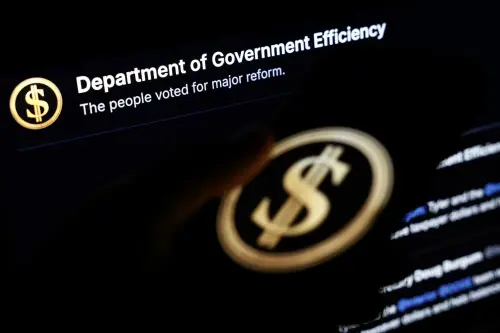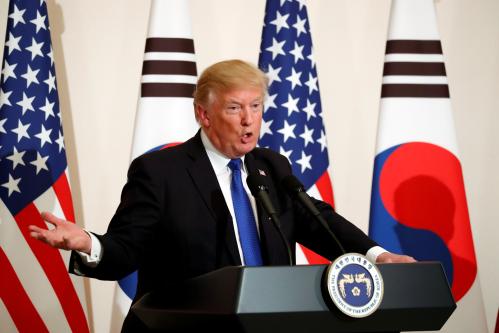“One of the most important outcomes of the Russian influence campaign, frankly, ladies and gentlemen, is not just to have the capability of intruding into records and processes, but, to shake the confidence of the American voter,” said retired General John Allen at a recent Brookings event on election security. He went on to call voting the “most profoundly important aspect of America,” one which “defines us as a great democracy.”
This was the general theme of the event, which examined the national security imperative of addressing foreign cyber interference in U.S. elections. The event featured Brookings Fellow Susan Hennessey, Alex Halderman of the University of Michigan, and Dean Logan of the Los Angeles County government. Michael O’Hanlon, senior fellow at Brookings, served as moderator.
O’Hanlon kicked off the discussion, essentially asking each panelist about the nature of the problem, which he called a “threat to American democracy and elections from foreign interference.”
General Allen was quick to emphasize that cyber interference in an election is truly a national security threat, as well as a domestic one.
He spoke about how his career as a military officer put him on the front line of defense, but that in cases like the alleged foreign interference into the 2016 presidential election, that duty falls into different hands. Thinking back to a talk he gave in 2017 to the National Association of Counties, he recounted: “I now think that you, the leaders of the counties of America, in many respects are the front line of defense of the most profoundly essential institution of American democracy.” Watch:
Recalling his own concern as evidence of foreign election interference mounted in 2016, Allen said: “I now recognize that, at the speed of light, the very heartland of America is under threat today.”
The conversation turned to Alex Halderman, a professor of computer science and engineering at the University of Michigan. Halderman is an expert on electronic voting systems and security.
He began by reinforcing Allen’s commentary. “We are living in a world where the states, and even the counties and local municipalities running elections, are suddenly on the front lines of international conflict,” he stated.
To understand the ongoing and evolving threat, we need first to know how we got here. Halderman delved into the what, the how, and the why of computerized voting, and explained these methods are particularly vulnerable to tampering. Watch:
While there is much cause for concern, Halderman said of the scariest prospect (of infiltrators changing votes or affecting the election outcome): “We don’t have any strong evidence that this has happened yet.” He followed up with a warning that “it is only a matter of time.”
Susan Hennessey, a fellow at Brookings and the managing editor of Lawfare, appealed to urgency. “We shouldn’t kid ourselves here. We should be candid and frank about the nature of the problem, and frankly how terrifying it is,” she began.
The threats faced are complex and varied, she said, and so are any potential solutions. Many questions swirl: What is the broader context? What makes voting a core democratic choice? How are elections managed and administrated? With varied and interrelated issues at hand, “the threats, solutions, and risks, are quite different,” Hennessey argued. Watch:
Pointing out that one of the easiest things for an adversary to do is “undermine confidence, and to insert real questions about the outcomes of elections,” Hennessey suggests that this is also an issue of messaging.
“In some ways, we have achieved our adversary’s own goal.” Rather than bury our heads in the sand, Hennessey pointed to the need for a “real conversation … that is sensitive to not wanting to create the bad outcome of undermining confidence.”
Dean Logan, a registrar-recorder and county clerk for Los Angeles County in California, reminded the audience of the broad and multi-dimensional nature of the threat.
“As election administrators, we have to be aware. We have to recognize that this is a part of our responsibility now,” Logan said. “We operate in a decentralized environment” and “elections are under resourced,” he went on, stating both increase the scope of this problem. While it is a daunting task to counter all of these concerns, officials at many levels are combating it. Watch:
Michael O’Hanlon then listed four threats in particular and asked the panelists to opine on which was most serious. The list included propaganda, e-mail theft/release, interference in the processes of voting, and votes being changed.
Logan interjected that it “depends where you sit.”
As an election administrator, “the most immediate threat is the crisis of confidence and crisis of participation,” Logan stated. He went on unequivocally, concluding that “the health of our democracy depends on continuing to conduct elections … if people aren’t participating, then we are losing in that battle.”
Halderman agreed, and noted “we need a strategy for defending against both information warfare and attacks on election infrastructure.” He pointed to the fact that there have already been enemy successes in both areas, and inferred that tactics will become more sophisticated over time.
Allen reiterated: “The enemy wins if the American voter perceives there is no value to going to the polls anymore.”
The idea of varied threats was persistent throughout the conversation.
“Ignoring one at the expense of the other is a recipe for disaster,” Hennessey remarked. She went on to say 2016 should be a “wake up call” for the “necessary resources and awareness that should follow.” Of key importance is realizing that this is critical to the core of our democracy, she reminded.
To that point, Allen reiterated: “The enemy wins if the American voter perceives there is no value to going to the polls anymore.” He went on to say that officials must educate the public, and embrace solutions, but that everyone also needs to do more to understand what we face.
“We have to address it for what it is, which is a direct assault upon the integrity of the democracy of the United States of America.” Allen concluded, “if we’re able to depict it that way we can call upon the patriotism of our citizens to vote.” Watch:
The Brookings Institution is committed to quality, independence, and impact.
We are supported by a diverse array of funders. In line with our values and policies, each Brookings publication represents the sole views of its author(s).



Commentary
Securing the vote is critical to preserving American democracy
September 21, 2017